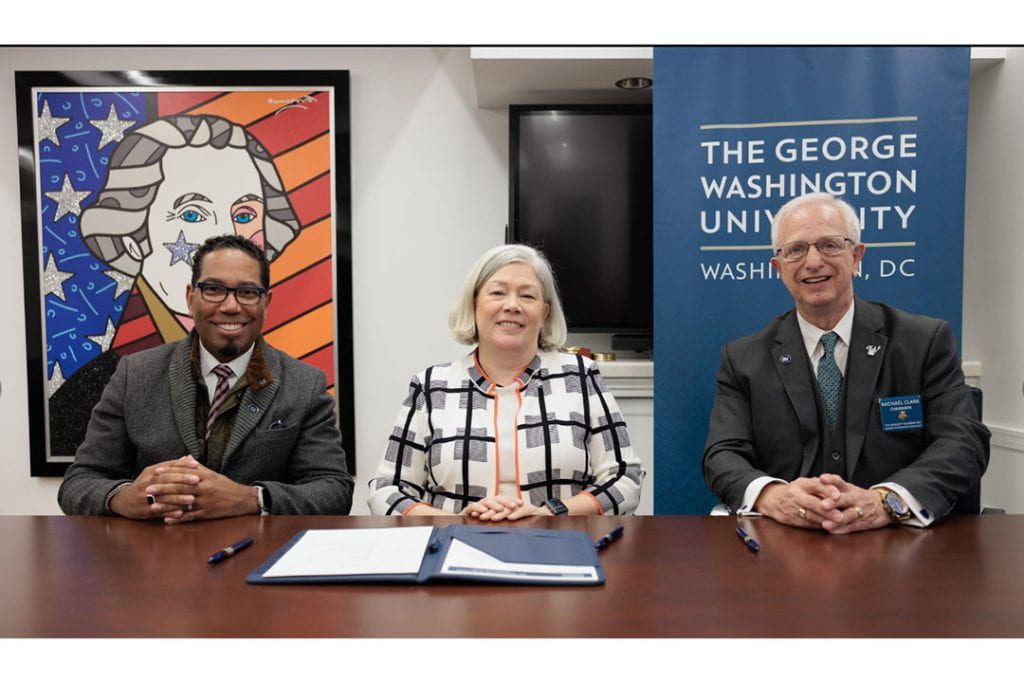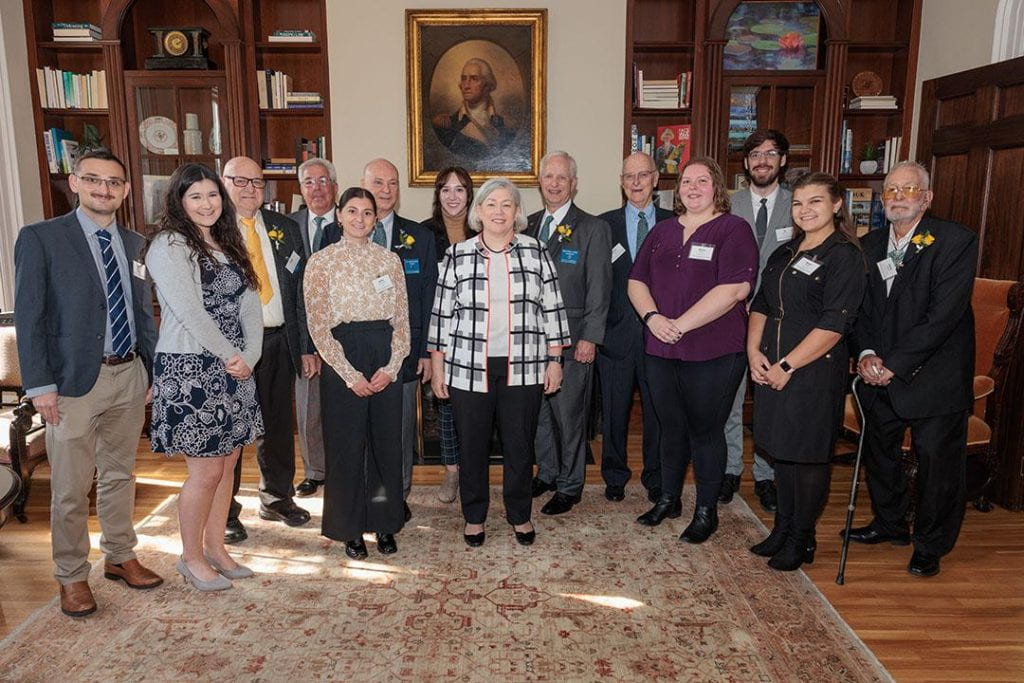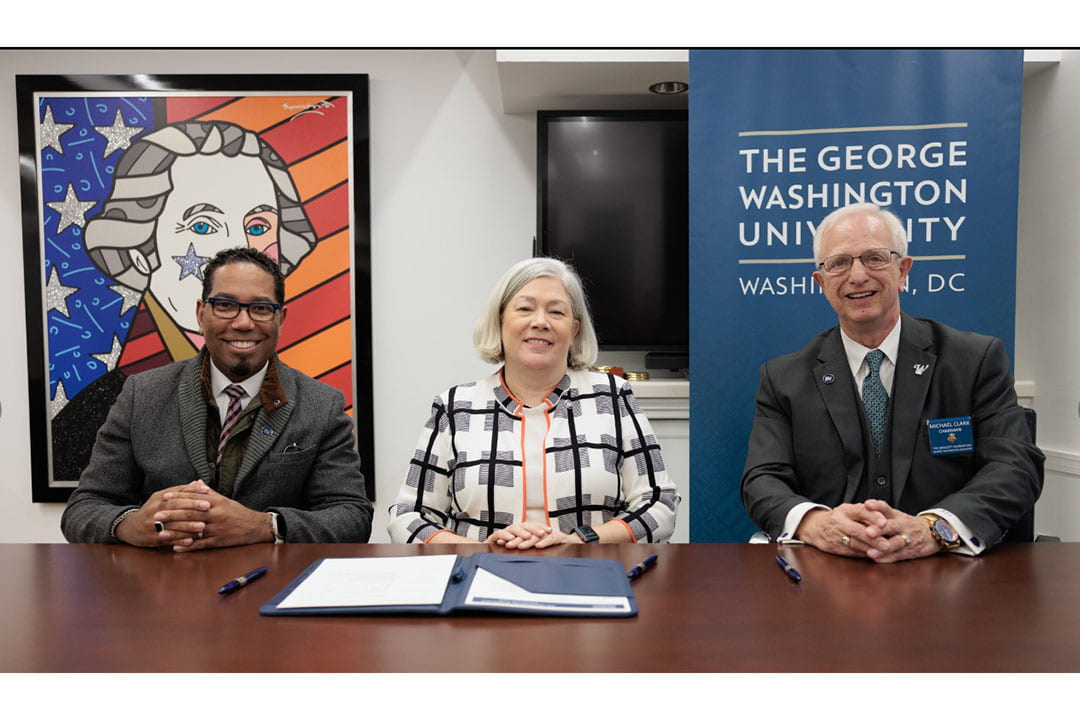Endowment continues a 70-year tradition that has opened doors for more than 500 GW students.
Authored by: Rahim Jessani

To realize her dream of working in international trade policy, Tiffany Smith, M.A. ‘91, knew she needed a graduate degree. But attending GW’s Elliott School of International Affairs in the nation’s capital seemed out of reach for the Texan.
Smith’s career path opened up when she received the Wolcott Foundation Fellowship, which helped with her tuition and gave her the financial stability to pursue unpaid internships during her studies.
“I never would have made it to D.C. for graduate school without the Wolcott Foundation Fellowship,” said Smith, now the National Foreign Trade Council’s vice president of global trade policy. “Everything that I have achieved in my career in trade policy is directly a result of being selected as a Wolcott Fellow and attending GW.”
Since 1953, more than 500 GW students like Smith have benefited directly from the foundation’s annual funding of the Wolcott Foundation Fellowship program. Now, thanks to a $4 million gift to GW’s endowment from the Wolcott Foundation, more students like Smith can pursue careers in public service for generations to come. This gift also transitions the fellowship’s administration to GW—a meaningful tribute to the enduring seven-decade relationship between the Wolcott Foundation and GW.
The Wolcott Foundation’s investment in these students stems from its mission of using education as the driving force to create a “moral compass in government,” an ode to its Masonic origins. According to Michael Clark, chair of the Wolcott Foundation, GW is the ideal university that unites education and public service because of its location in the nation’s capital and its revered founder, George Washington, who was a Mason.
“I believe in GW, and I am thrilled that the positive impact we have on students now will last forever because of the tremendous work of GW,” said Clark. The Wolcott Foundation is a non-profit supported by High Twelve International, an organization of Master Masons dedicated to the welfare of humankind and civic affairs.
The fellowships provide critical support for students seeking to learn from GW’s internationally recognized faculty, participate in impactful research and service, and take advantage of the mentoring and career development opportunities that prepare them to serve the public interest and influence public policy, GW President Ellen M. Granberg noted.
“Students seeking public service careers have a passion for changing the world, and GW is one of the best institutions in the world when it comes to cultivating the next generation of leaders in this sector,” Granberg said. “We are immensely grateful for the Wolcott Foundation’s longstanding support of talented students and value their trust in our ability to continue their legacy.”
Donna Arbide, GW’s vice president for development and alumni relations, explained that alumni from this cohort have gone on to serve in important capacities in the federal government, international business and represent the U.S. in foreign relations, such as former American ambassador to Honduras, Charles Ford, M.A. ‘75.
“It’s impossible to understate the positive impact of the Wolcott Fellows on individuals, society and frankly, on our democracy,” Arbide said. “At GW, we change the world one life at a time, and the Wolcott Foundation has helped hundreds of students go on to make a real difference. It’s an amazing illustration of the power of philanthropy in action.”

The Wolcott Foundation funds fellowships of up to $30,000 for graduate students in GW’s School of Business (GWSB), the Elliott School of International Affairs (ESIA) or the Trachtenberg School of Public Policy and Public Administration (TSPPPA). Award criteria are outstanding academic, civic and social credentials and a commitment to civic service.
“Thanks to my Wolcott Fellowship, I achieved my aspirations to devote my life as a public servant and a catalyst for international goodwill,” said G. Lincoln McCurdy, M.A.‘75, who has received multiple international awards for his work in building U.S.-Turkey commercial relations and people-to-people diplomacy. “The Wolcott Foundation not only provided me with the financial means to study at GW, but members of the foundation took an interest in the fellows and provided a supportive social network.”
During their degree programs, Wolcott Fellows benefit from strong mentoring and networking opportunities provided by the foundation. After graduation, the foundation’s robust support of its award recipients helps Wolcott Fellows build community and achieve their career aspirations.
“Getting to know the other Wolcott Fellows and Wolcott alumni network—including leaders in government and those dedicated to public service—was a springboard for my own career,” said David Okun, M.A. ‘16, a State Department country officer working to deter and resolve international child abductions.
Former fellow Alivia P. Roberts, M.P.A. ‘20, believes the foundation’s holistic approach to the student experience transforms the pathway for public servants to succeed.
“The Wolcott Foundation should be proud of their work as it changes the trajectory of public servants,” said Roberts, director of federal government affairs at the Motion Picture Association. “Being a Wolcott Fellow gave me an advantage when entering the workforce and in my life. I am so grateful for the foundation’s commitment in helping students like me become better versions of themselves, build relationships with like-minded scholars, and serve their communities.”
Interested students can find more information, including the fellowship application, online. The deadline for applications is Jan. 15, 2024.
To open doors of opportunity for talented graduate students in business, international affairs and the Trachtenberg School of Public Policy and Public Administration committed to careers in public service, please consider a contribution to the Wolcott Foundation Fellowship Fund.

